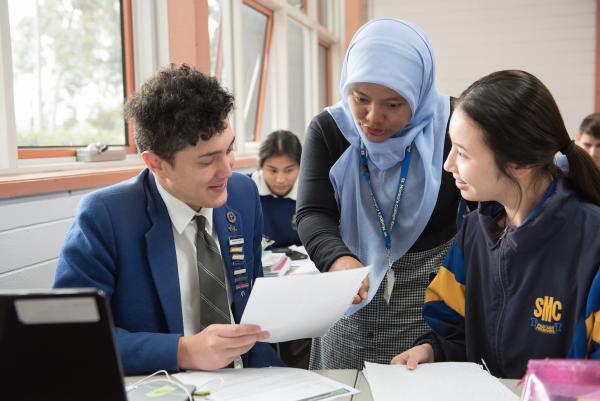My first two months teaching that class on a Monday morning felt like a something straight out of Mean Girls.
If you haven’t seen the film, I’ll set the scene: The faculty and staff at the high school have gathered all the girls in the gym to talk about bullying. The most popular girl, and biggest bully, Regina George, raises her hand to ask why she has to be there because she hasn’t been mean to anyone. In response, Tina Fey’s character, Ms. Norbury, asks the crowd a very straight-forward question: How many of you have ever felt personally victimized by Regina George? The hands of all the female students shoot skyward. Meanwhile in the background, teachers, staff and even the principal slowly and sheepishly raise their hands in agreement.
For those first two months, that class felt like the embodiment of Regina George.
I’ve had experiences with middle-schoolers before. In the summer of 2006, after my first year at university, I was a day camp counsellor for a group of 10-year-olds who would be going to a new school to start sixth grade in the fall. I was struck by the many dichotomies: young enough to still act like babies, but old enough to challenge me and push my buttons on purpose. I found them to be quite difficult to work with, but as time went by, I learned how to deal with this peculiar age group.
I was struck by the many dichotomies: young enough to still act like babies, but old enough to challenge me and push my buttons on purpose.
In Spain, however, they don’t have the concept of middle school. There’s primary school, which essentially encompasses pre-school to sixth grade, and secondary school, which is more or less grade seven to 12.
Students in first ESO (Educacion Secundaria) are 12 and are on that awkward cusp between leaving primary school and entering a place where they are the youngest and physically (by miles) smallest. It was this transitional period that had me wondering just how to appeal to them. I caught on to how to joke and interact with my older students quickly, but this group had me scratching my head.
It wasn’t just the lack of ideas for how to connect with them. It was the fact I felt legitimately bullied when I was in front of the class. They mimicked my accent, asked me to repeat things just so they could laugh at my pronunciation. They talked about me in Spanish, thinking I couldn’t understand them. (I do, in fact, speak Spanish to a B2 level). Overall, it was the complete lack of respect and rude behaviour that made me dread Monday mornings.
And to be honest, I was completely crushed to not be liked by them.
I tried many times to give myself a pep talk.
How can a 31-year-old woman feel bullied by 12-year-olds? It seemed absurd. But after confiding in my mom, a since-retired veteran teacher, she said it was absolutely as it sounded. Kids can be cruel—not just to each other, but to adults as well. She told me to hang in there, assured me things would get better.
And I don’t know how, or when the transformation began, but they did get better. Much better. Maybe it was the fact I also assisted in their gym class and was able to let a bit of my silly side show with some of the nice girls and the other students noticed. Maybe it was my lessons—the lessons I tried so hard to make fun and interactive. Maybe it was the fact that despite their disrespect, I still encouraged and believed in them. Whatever it was, a complete 180 has been made and I couldn’t be happier.
In gym class, students will tell the main teacher that they want to stand by me during the stretches. After our English lesson on Mondays, a few boys regularly start the chant, “Yes! Yes! Andrea is the best!” as I leave the classroom.
They are active and enthusiastic participants during class and are actually getting the hang of English. Earlier this week, a girl who is one of the weaker students called me over to show me her exam grade. She had squeaked by to pass with a five. While I wasn’t entirely impressed, I didn’t let it show and instead praised her great effort. Just then, my co-teacher sidled over to me, pointing at the test paper. “She used to get ones. I’m so happy she’s improving.” It’s a moment every educator relishes: Seeing the difference you’re making in your students’ studies.
It’s funny to look back on those early days now because one of my most hated classes has now become one of my most loved. Sure, they still can get out of hand. They talk too much when they should be working and shout out answers when they should be raising their hands. But unlike before, I find their exuberance endearing and downright loveable. And when their chants follow me out of the classroom and draw stares in the hallway, even though I pretend to feign embarrassment, I feel like the most popular kid in school.
Add this article to your reading list




